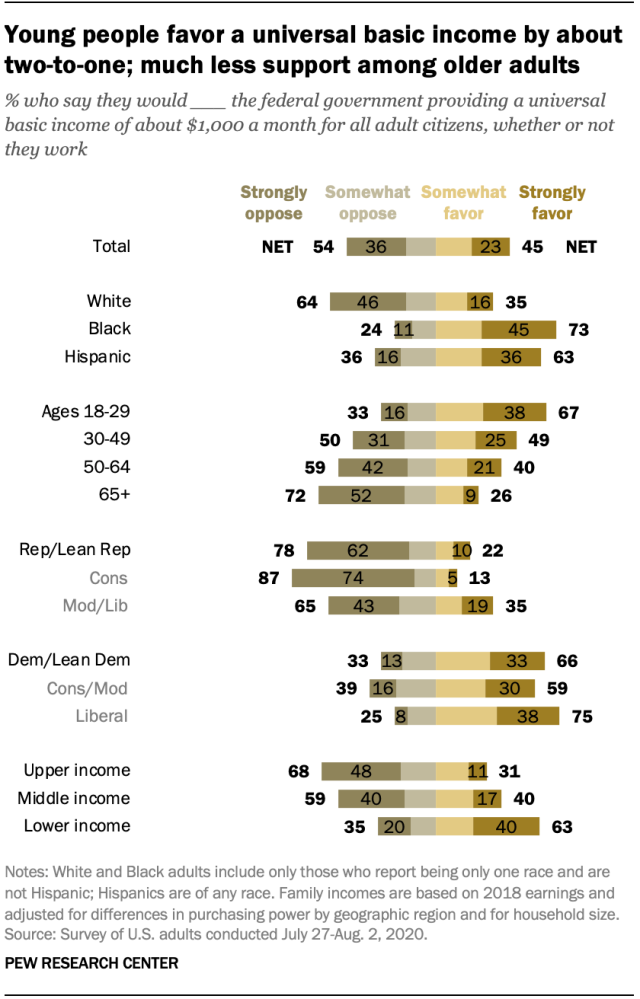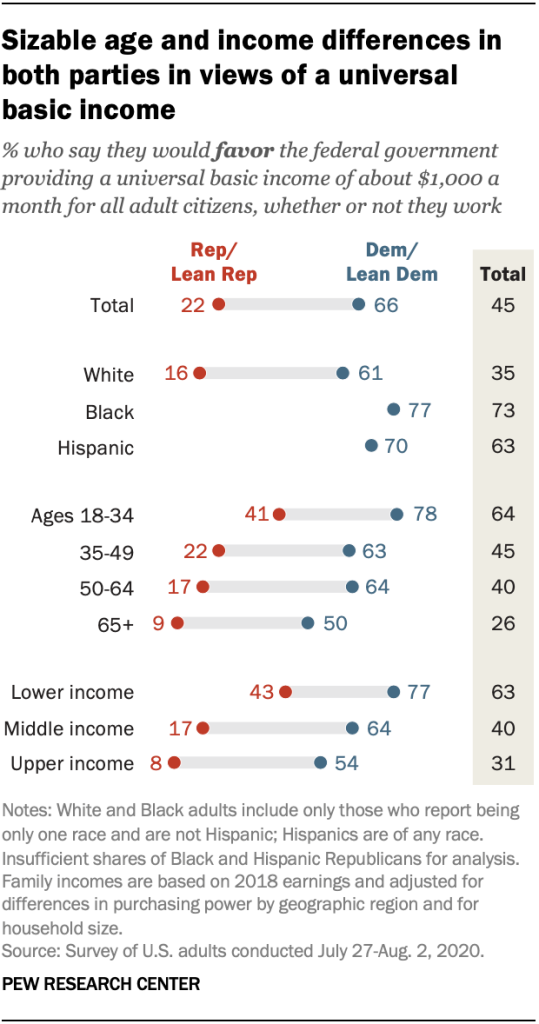A narrow majority of U.S. adults (54%) say they would oppose the federal government providing a guaranteed income – sometimes called a universal basic income (UBI) – of about $1,000 per month for all adult citizens, whether or not they work; 45% favor the proposal.
The idea of the government providing a universal basic income for all adult citizens draws broad and intense opposition among Republicans, but is generally supported by Democrats, according to a new Pew Research Center survey.
Nearly eight-in-ten Republicans and Republican-leaning independents (78%) oppose the federal government providing a universal basic income of about $1,000 per person, with 62% strongly opposed. A smaller share of Democrats and Democratic leaners (66%) favor a UBI, with just a third supporting the proposal strongly.
UBI was the centerpiece of former Democratic presidential candidate Andrew Yang’s campaign. Yang is scheduled to speak to the Democratic National Convention on Aug. 20, shortly before Joe Biden accepts the party’s presidential nomination.
Pew Research Center conducted this study to understand Americans’ views of the federal government providing a guaranteed income for all adult citizens. For this analysis, we conducted an online survey of 11,001 U.S. adults between July 27 and Aug. 2, 2020.
Everyone who took part is a member of the Center’s American Trends Panel (ATP), an online survey panel that is recruited through national, random sampling of residential addresses. This way nearly all U.S. adults have a chance of selection. The survey is weighted to be representative of the U.S. adult population by gender, race, ethnicity, partisan affiliation, education and other categories. Read more about the ATP’s methodology. Here are the questions used for this report, along with responses, and its methodology.
There also are wide age, race and income differences in views of the government providing a universal basic income of about $1,000 for each adult citizen, whether or not they work. Adults under age 30 favor the government providing a UBI by roughly two-to-one (67% to 33%). There is far less support among older adults: 72% of those 65 and older oppose the proposal, while just 26% are in favor.
Majorities of Black (73%) and Hispanic adults (63%) favor the government providing a UBI, compared with 35% of White adults. And while the proposal draws broad opposition from adults in upper- and middle-income households, a 63% majority of those in lower-income households favor it.
In both parties, younger adults and those with lower incomes express higher levels of support for the federal government providing a UBI for all adult citizens. While majorities of Republicans across age groups oppose the UBI proposal, 41% of Republicans ages 18 to 34 favor it, by far the highest share of any GOP age group.
Among Democrats, support for a UBI also is much higher among adults ages 18 to 34 than among older people.
About four-in-ten Republicans in lower-income households (43%) favor the government providing a universal basic income, compared with 17% of those with middle incomes and just 8% of those with upper incomes. There are similar income differences among Democrats. Still, Democrats across income and age categories are far more likely than Republicans in those groups to favor a universal basic income.
There are also racial and ethnic differences in these views among Democrats, though majorities of Black (77%), Hispanic (70%) and White Democrats (61%) support the federal government providing a universal basic income for all adult citizens.
Note: Here are the questions used for this report, along with responses, and its methodology.
CORRECTION: (Jan. 5, 2021): In the chart “Young people favor a universal basic income by about two-to-one; much less support among older adults,” the label for the total “strongly favor” amount has been updated to 23% to correct a typographical error. This change did not affect the report’s substantive findings.





